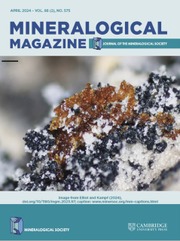Crossref Citations
This article has been cited by the following publications. This list is generated based on data provided by
Crossref.
Lauchnor, Ellen G.
Schultz, Logan N.
Bugni, Steven
Mitchell, Andrew C.
Cunningham, Alfred B.
and
Gerlach, Robin
2013.
Bacterially Induced Calcium Carbonate Precipitation and Strontium Coprecipitation in a Porous Media Flow System.
Environmental Science & Technology,
Vol. 47,
Issue. 3,
p.
1557.
Stylo, Malgorzata
Alessi, Daniel S.
Shao, Paul PaoYun
Lezama-Pacheco, Juan S.
Bargar, John R.
and
Bernier-Latmani, Rizlan
2013.
Biogeochemical Controls on the Product of Microbial U(VI) Reduction.
Environmental Science & Technology,
Vol. 47,
Issue. 21,
p.
12351.
Mohapatra, B.R.
Dinardo, O.
Gould, W.D.
and
Koren, D.W.
2014.
Reference Module in Earth Systems and Environmental Sciences.
Natrajan, Louise S.
Swinburne, Adam N.
Andrews, Michael B.
Randall, Simon
and
Heath, Sarah L.
2014.
Redox and environmentally relevant aspects of actinide(IV) coordination chemistry.
Coordination Chemistry Reviews,
Vol. 266-267,
Issue. ,
p.
171.
Moll, Henry
Lütke, Laura
Bachvarova, Velina
Cherkouk, Andrea
Selenska-Pobell, Sonja
and
Bernhard, Gert
2014.
Interactions of the Mont Terri Opalinus Clay IsolateSporomusasp. MT-2.99 with Curium(III) and Europium(III).
Geomicrobiology Journal,
Vol. 31,
Issue. 8,
p.
682.
Brookshaw, Diana R.
Coker, Victoria S.
Lloyd, Jonathan R.
Vaughan, David J.
and
Pattrick, Richard A. D.
2014.
Redox Interactions Between Cr(VI) and Fe(II) in Bioreduced Biotite and Chlorite.
Environmental Science & Technology,
Vol. 48,
Issue. 19,
p.
11337.
Handley-Sidhu, S.
Hriljac, J. A.
Cuthbert, M. O.
Renshaw, J. C.
Pattrick, R. A. D.
Charnock, J. M.
Stolpe, B.
Lead, J. R.
Baker, S.
and
Macaskie, L. E.
2014.
Bacterially Produced Calcium Phosphate Nanobiominerals: Sorption Capacity, Site Preferences, and Stability of Captured Radionuclides.
Environmental Science & Technology,
Vol. 48,
Issue. 12,
p.
6891.
Newsome, Laura
Morris, Katherine
and
Lloyd, Jonathan R.
2014.
The biogeochemistry and bioremediation of uranium and other priority radionuclides.
Chemical Geology,
Vol. 363,
Issue. ,
p.
164.
López-Fernández, Margarita
Fernández-Sanfrancisco, Omar
Moreno-García, Alberto
Martín-Sánchez, Inés
Sánchez-Castro, Iván
and
Merroun, Mohamed Larbi
2014.
Microbial communities in bentonite formations and their interactions with uranium.
Applied Geochemistry,
Vol. 49,
Issue. ,
p.
77.
Martinez, Robert J.
Beazley, Melanie J.
and
Sobecky, Patricia A.
2014.
Phosphate-Mediated Remediation of Metals and Radionuclides.
Advances in Ecology,
Vol. 2014,
Issue. ,
p.
1.
Jabbar, Tania
and
Wallner, Gabriele
2015.
Radionuclides in the Environment.
p.
169.
Moll, Henry
Lütke, Laura
and
Cherkouk, Andrea
2015.
Radionuclides in the Environment.
p.
209.
Seeprasert, Prapamon
Yoneda, Minoru
and
Shimada, Yoko
2016.
The Influence of Soil Fungi on the Sorption of Cesium and Strontium in the Soil Organic Layer.
International Journal of Environmental Science and Development,
Vol. 7,
Issue. 6,
p.
415.
Hazotte, A.A.
Peron, O.
Abdelouas, A.
Montavon, G.
and
Lebeau, T.
2016.
Microbial mobilization of cesium from illite: The role of organic acids and siderophores.
Chemical Geology,
Vol. 428,
Issue. ,
p.
8.
Brookshaw, Diana R.
Lloyd, Jonathan R.
Vaughan, David J.
and
Pattrick, Richard A. D.
2016.
Effects of Microbial Fe(III) Reduction on the Sorption of Cs and Sr on Biotite and Chlorite.
Geomicrobiology Journal,
Vol. 33,
Issue. 3-4,
p.
206.
Anbu, Periasamy
Kang, Chang-Ho
Shin, Yu-Jin
and
So, Jae-Seong
2016.
Formations of calcium carbonate minerals by bacteria and its multiple applications.
SpringerPlus,
Vol. 5,
Issue. 1,
Zhu, Tingting
and
Dittrich, Maria
2016.
Carbonate Precipitation through Microbial Activities in Natural Environment, and Their Potential in Biotechnology: A Review.
Frontiers in Bioengineering and Biotechnology,
Vol. 4,
Issue. ,
Gerber, U.
Zirnstein, I.
Krawczyk-Bärsch, E.
Lünsdorf, H.
Arnold, T.
and
Merroun, M.L.
2016.
Combined use of flow cytometry and microscopy to study the interactions between the gram-negative betaproteobacterium Acidovorax facilis and uranium(VI).
Journal of Hazardous Materials,
Vol. 317,
Issue. ,
p.
127.
Moll, Henry
Cherkouk, Andrea
Bok, Frank
and
Bernhard, Gert
2017.
Plutonium interaction studies with the Mont Terri Opalinus Clay isolate Sporomusa sp. MT-2.99: changes in the plutonium speciation by solvent extractions.
Environmental Science and Pollution Research,
Vol. 24,
Issue. 15,
p.
13497.
Chen, Tao
Li, Jiwei
Shi, Peiheng
Li, Yi
Lei, Jia
Zhou, Jian
Hu, Zuowen
Duan, Tao
Tang, Yongjian
and
Zhu, Wenkun
2017.
Effects of Montmorillonite on the Mineralization and Cementing Properties of Microbiologically Induced Calcium Carbonate.
Advances in Materials Science and Engineering,
Vol. 2017,
Issue. ,
p.
1.


